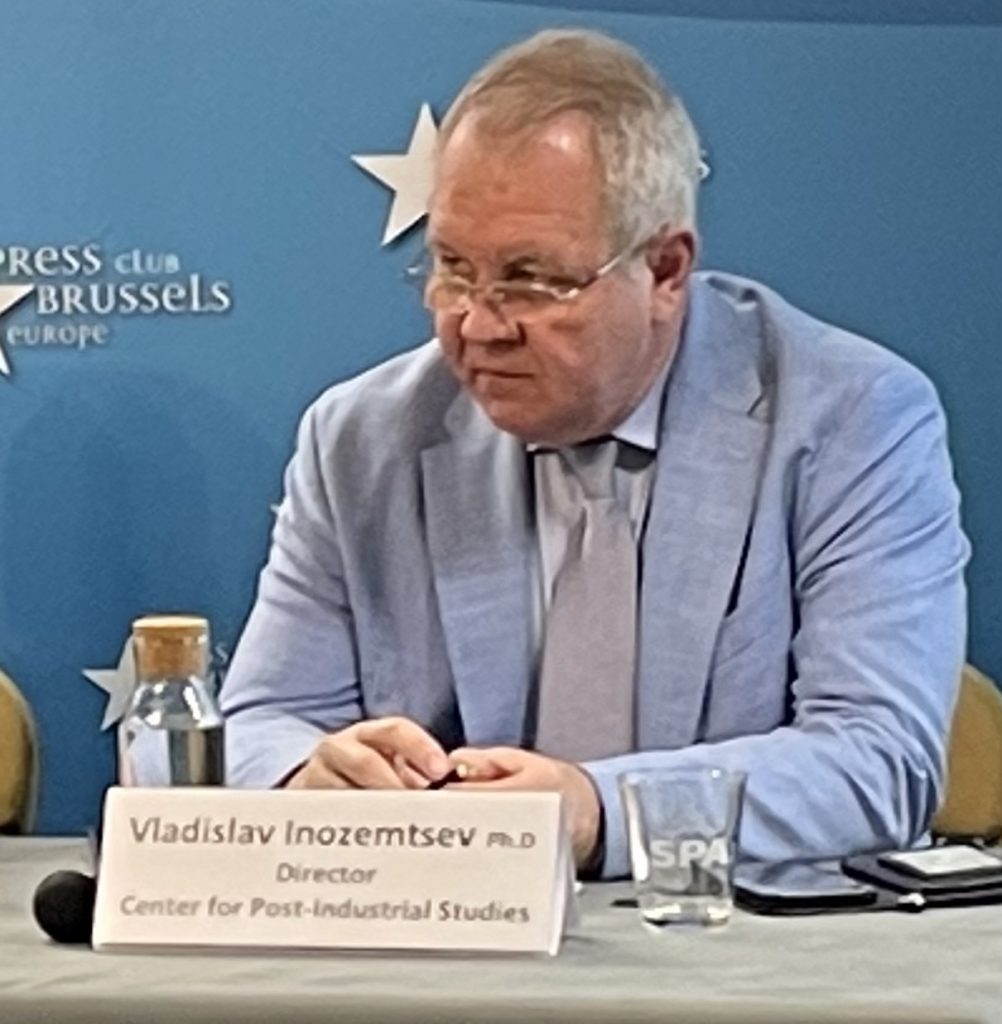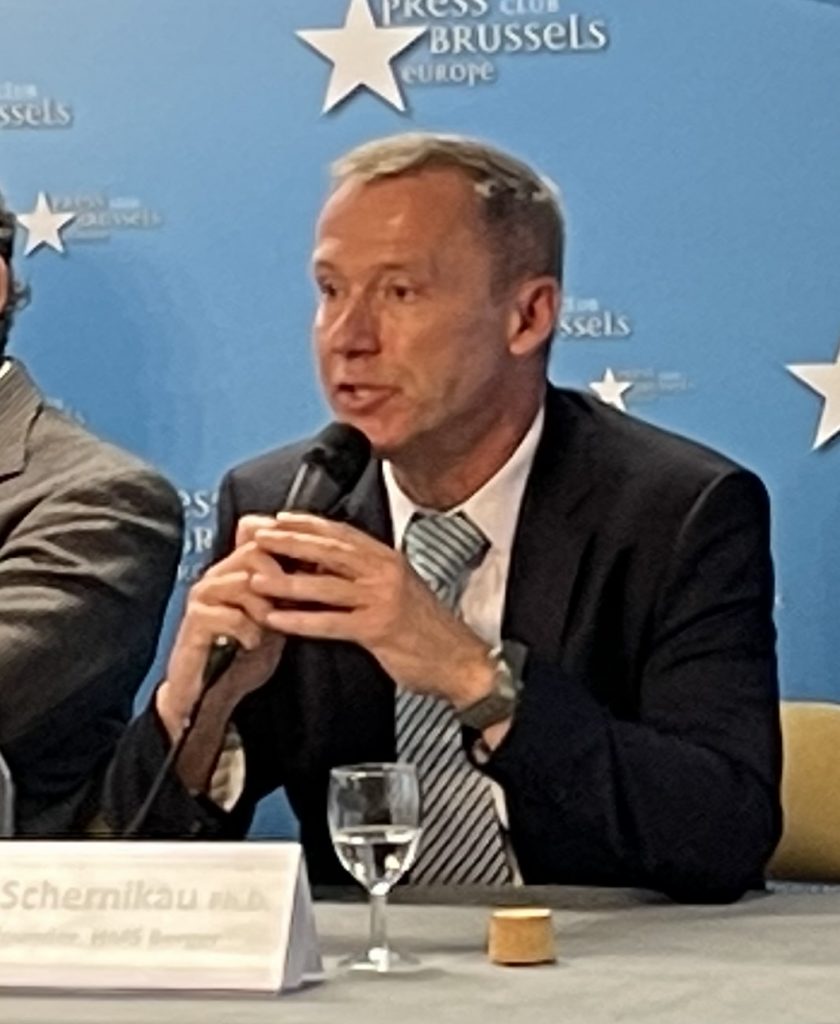Photo by Markus Clemens on Unsplash
A leading energy expert has urged the EU and international community to ensure coal remains part of Europe’s future energy mix.
Vladislav Inozemtsev, speaking in Brussels, said this was not to diminish the role renewables potentially can play in meeting the continent’s energy needs.
But, with the ever-present threat of Russia cutting off energy supplies to Europe and the ongoing war in Ukraine, he said it was vital to keep all options open when it comes to energy.
He also warned that current EU economic sanctions against Russia could prove to be “counter productive.”
Inozemtsev, director of the Centre for Post Industrial Studies, was speaking in a debate on energy in Brussels on 21 February. The event heard how the Russian economy is heavily dependent on energy and that, with China and India continuing to buy Russian oil, the focus has shifted to the EU’s trading relationship with Moscow.
On the EU’s current energy policy, Inozemtsev predicted that the war in Ukraine “will go on for at least another year and the EU needs to produce a new energy strategy towards Russia.”
Inozemtsev, who is a Russian national living in the U.S and a fierce critic of Putin’s Government, raised concern about the current sanctions regime against Russian energy companies, saying they could end up being counter-productive.
He said, “If you want to punish the Russian government you should start with those industries and companies which directly benefit the Russian government the most, such as nuclear.”
He cited the coal sector as a casualty of current policy. It is, he pointed out, “100 percent privately owned in Russia and does not belong to the State in any way.”
“It is important for EU business that Europe’s bulk commodity ports remain open for international trade in coal”
Vladislav Inozemtsev

He added, “Despite this, the coal sector and coal producing companies were among those which were first to be sanctioned by the EU. If we want to send a real signal to Russia my message is – don’t punish businesses such as coal companies.”
Turning to the EU’s energy strategy towards Russia, he said, “pressure on Russia should be more forceful than it is now but also done in a way that helps both the EU and Ukraine. The EU will, let us remember, still be dependent on fossil fuels for at least another 15 to 12 years.”
He added, “The Green agenda is a great idea and I support many of its objectives but we also do need what I might call a merger between the pursuit of greener energy and a new energy strategy between the EU and Russia. This is also necessary partly because, going forward, the EU needs to diversify its energy sources.”
He added, “Yes, EU pressure on President Putin should be intensified but it should also done in a way that will bring some benefits to Europeans.”
He was taking part in a debate at the Brussels press club on the EU’s future energy policy. This comes as the war in Ukraine rumbles on and with ever growing concern about the scale of EU energy dependency on Russian energy.
The two-hour conference on “European Energy Strategy”, was organised by the Hydrogen Institute together and GPF Geopolitical Futures and brought together a panel of energy experts who explored the EU’s long-term strategic energy objectives and economic well-being.
Another keynote speaker was Lars Schernikau, who is co founder of HMS Berger and who also touched on a similar theme – ensuring that fossil fuels like coal remain part of the energy mix for the EU in future.
He said, “Yes, I agree that to focus on the environment is really important and we have to consider energy’s environmental impact on our world. But don’t kid yourself: whatever we do has an impact on the environment.”
He spoke about a continuing need to emphasis the value of diversified energy supplies, including coal, saying, “Wind and solar will never work just on their own because some countries or regions just do not get sufficient wind or sun. If we rely too much on wind and solar this actually means that we run the real risk of running out of electricity.”
Schernikau, who works in the commodities community, said, “So,this begs the question: how can we in Europe have an energy policy that is not just all about wind and solar? This is needed because the wind and solar power sector on their own will not work. People must see the folly of such an energy policy which is essentially just about ‘saving the planet.’”
“I find it hard to understand how politicians do not see this.”
“By relying just on wind and solar we are running the real risk of what I call energy starvation. This is not being anti-Green but about being realistic.”
Schernikau has authored a key report on how best to tackle the energy crisis.
The report, which serves as a useful backdrop for the debate, opens by stating, “Considering the ongoing conflict in Ukraine, it almost seems inappropriate to discuss other matters. When lives are at stake, everything else becomes secondary.”
“But maybe it is excused considering that this political situation in Europe is also about access to energy.”
The scientific research paper by Dr Schernikau and Professor William Smith, of Washington University, St. Louis, is called ‘Climate Impacts of Fossil Fuels in Today’s Energy Systems’ and gives an example of how distorting and costly energy policy can be when it tries to account for environmental challenges without taking the full life-cycle of energy systems and all available information into account.
The research paper only uses officially reported IPCC and IEA information on the global warming potential of greenhouse gases (GHGs) and reported anthropogenic carbon dioxide (CO2) and methane emissions.
The research stated that less than half of CO2 emitted, 46% according to the IPCC, actually ends up in the atmosphere, and logically only this portion of CO2 can contribute to warming.
It said, “Thus, we need to stop talking about human-energy CO2 emissions, but start talking about changes in airborne CO2 , as only those can contribute to warming.”
His report says that current carbon taxation does not include life cycle emissions of any energy sources but focuses only on combustion.
Because of this “carbon pricing is misguided and distorts energy policy at the expense of the environment and the economy.”
He states that LNG is on average ‘less favourable for the climate’ than any coal.
The results were surprising even to the authors.
The research “provides the coal industry with the substantiation needed to strengthen the case for its importance to the power mix.”
It adds, “The conclusions underscore a critically important point for energy and the environment. We need to analyse the true life-cycle emissions and non GHG environmental impact for the entire value chain for all conventional and renewable energy, including for hydrogen and batteries.”
He accepts the findings may surprise some, adding, “Imagine the European Union pledging coal and nuclear as ‘green’ rather than natural gas and nuclear.”
The report he authored states that the world requires all reliable and affordable fuels for power generation including gas, coal, nuclear, hydro, geothermal, and selectively wind and solar. Only a balanced power mix can avoid electricity shortages and the devastating effects on humans and industries as experienced globally during the past 18 months.
He said, “However, there is no one size fits all power solution. Investors should support all energy systems in a manner which avoids an energy crisis, including intermittent renewable energy systems where they make sense.”

“Energy policy must refocus on its three objectives, energy security, energy affordability, and environmental protection.”
Lars Schernikau
He told the conference there was a vital need to support investment in energy systems to improve their efficiencies and reduce the environmental burden of energy.
Event organiser, the Molecular Hydrogen Institute (MHI), is a non-profit scientific organization consisting of professors, researchers, and other prominent academics and the foremost authority on the science of molecular hydrogen. GPF Geopolitical Futures, founded in 2015, is a Texas-based company which provides geopolitical forecasts.




